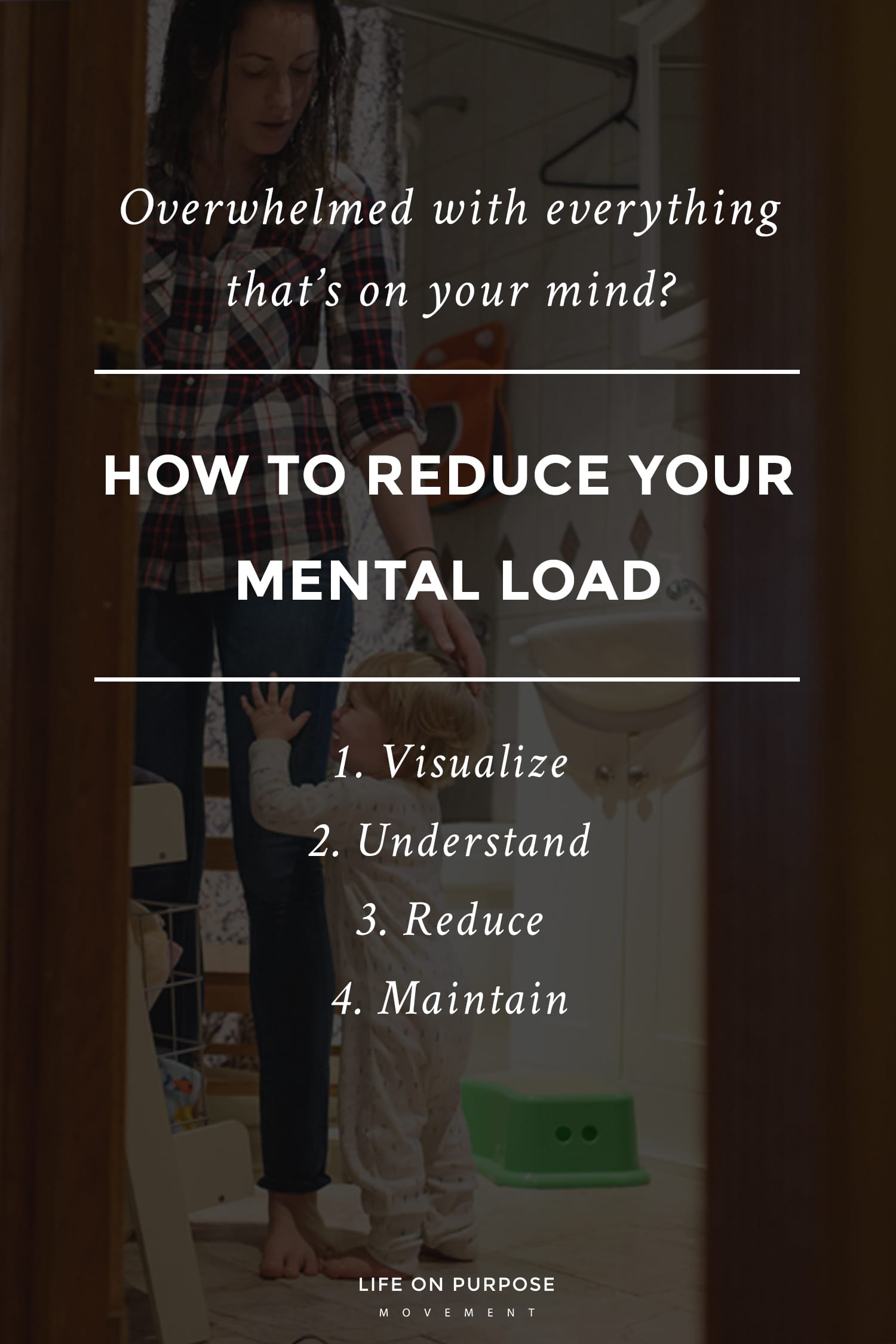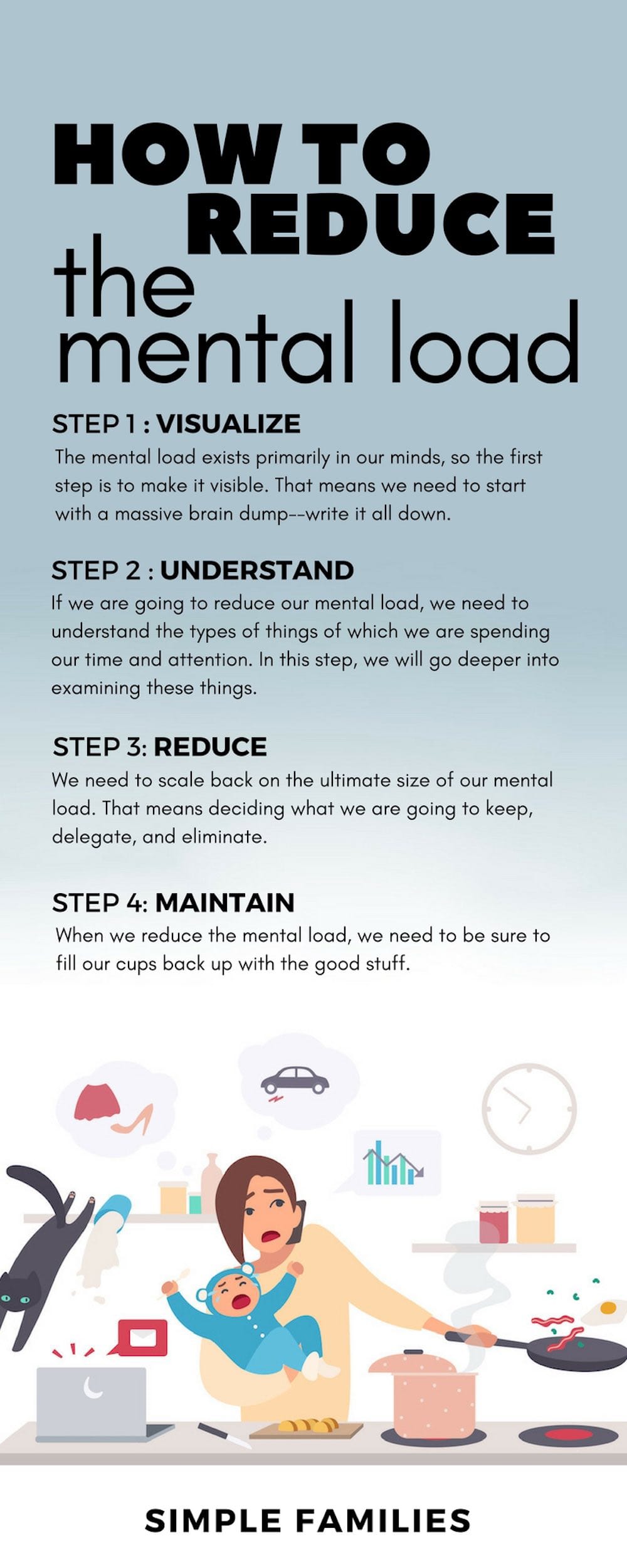A big welcome to Denaye Barahona of the Simple Families site and podcast.
Do you ever wash the sheets?
It was the question that started it all. One day while making the bed my husband casually asked me, “Do you ever wash the sheets?” It wasn’t a question of curiosity; it was a question of sanitation. You see, my husband doesn’t see me wash the sheets. He leaves early in the morning and comes back late at night.
I work from home and take care of our young children, so I do the laundry during the day. When it’s time to wash the sheets, I strip the bed, wash them, then put them back into place.
It’s almost like it never happened.
Kind of magic, really.
My brain has become adept at running our home and family like a well-oiled machine. This machine often works the magic of making it all look like it never happened. Planning it all, remembering it all, knowing it all, and worrying about it all—all within the confines of one tired, overworked brain.
This is the invisible mental load of motherhood.
There are many days when I feel as if my brain may explode. I must keep a constant supply of clean underwear in the drawers, a stash of emergency snacks in my purse, and ensure flu shots are administered before the peak of the season is upon us.
I do all this while trying to sustain some semblance of a career, sanity, and toned arms.
The Plan: How to Reduce the Mental Load
The mental load of it all consumed me. So I made a plan.
I knew I needed to wrangle my exploding brain and get a handle on this motherhood journey (of which I’ve only skimmed the surface). I am going to keep this simple, because if you are still reading I’m going to take a wild guess that you are also blessed with a very capable, yet nearly-exploding brain. So here’s how I reduced the mental load in four steps.
WANT TO DO THIS WITH COMMUNITY?
—
Step 1: Visualize
The vast majority of the mental load is invisible. It’s the planning, worrying, researching, and anticipating that consumes our minds. Therefore, the first step is to make it visible. That means, take everything out of your head and put it onto paper. I took the mental load out of my head and turned it into a pile of note cards. Each card earned a separate piece of the mental load.
- Anticipate when we will run out of toothpaste.
- Ensure that children use the toothpaste.
- Make sure that Crest doesn’t cause cancer.
You get the drift. Every notecard holds a piece of the larger mental load. When executing this massive brain dump, I was stunned at how much of the mental load was invisible even to me. The sheer amount of material that a parent considers, processes, and executes each day is astounding.
It’s no wonder that we feel stressed out, right?
—
Step 2: Understand
Once the brain dump is complete, I worked to develop a better understanding of it all. I sorted and divided my mental load into three categories: planning, worrying, executing. This helped me to better understand where I was putting most of my energy and time.
- Be sure everyone has an extra blanket in case the night gets cold
- Remember to bring extra shirt for the baby when we eat Italian food.
- Make sure the big kid pees before we leave the house.
Most days the mental load feels like a massive jumble in my head. Therefore, sorting it out and understanding exactly what my overwhelm really looked like was a huge learning experience.
—
Step 3. Reduce
Reduction was also a three-part sorting process: keep it, delegate it, or eliminate it. There were many no-brainers that I had to “keep” in my mental load, like packing lunches. The kids have to eat, right?
I’ve always struggled with asking for help and delegating. My husband is very helpful with the kids and our family, but he thrives when he knows exactly what he needs to be doing. So by handing off a physical piece of my mental load to him (i.e. a handful of cards) he appreciated having it all in written down.
The best part of this process was elimination–which was the biggest way I reduced my mental load. I became aware of plans, worries, and actions that weren’t necessary and weren’t serving me. Tossing those into the trash–once and for all–felt great.
—
Step 4. Maintain
Whenever we make big changes, it’s important that we stick with them. Reducing the mental load is vital, but also replacing many of those thoughts and worries with healthy alternatives is also necessary. I am on the journey to find a consistent mindfulness practice–dabbling in yoga, meditation, and generally just being completely present with my family.
Motherhood is a gift and I want to enjoy it as much as possible. That means reducing my mental load so that I can focus on being exactly the woman, wife, and mama that I want to be.
—
Starting this Wednesday, Denaye will be guiding a like-minded group of mothers through this process.
It’s a 30-day, digestible email series that I know will leave you with so much more clarity and relief by the end. (Erica note: The private Facebook group alone is easily worth the $30 cost of the series!)
Join us, and let’s reduce the mental load together! Learn more, right here.
We’d love to hear—Is the mental load something that weighs on you? (Tell us we’re not alone!)







I love this. Like many mamas, I’ve taken it upon myself to do everything, and it suddenly hit me this week what a load it is, and how inside I’m feeling annoyed at my husband for not doing more. I have to do everything, I think. Well, I don’t. He’s willing to help, but probably could use some gentle guidance, and my daughter is old enough now (6) to take on more tasks herself. Dumping all of this out of my head and onto paper has helped with other things (anxiety, remembering lists) so why not with my endless daily mind-chatter? We could all use a purge of unneccasry demands and thoughts, I bet.
Well said, Mary! I’m glad this was timely for you, and thanks for adding to our discussion!
Whilst I enjoyed this article on organisation, I am disheartened to see it as yet another “men are silly”, and “mothers have to do it all” essay, even down to your statement, “make sure the big kid pees”…? Really?? We’re all capable adults. If you want respect, treat others with respect.
Marnie., I beleive the “big kid peeing” comment is directed at her older child out of nappies and not her husband.
I completely identify with this article and I don’t feel that my husband is silly and incapable— he just plain does not feel the stress and the weight of all the things I’m juggling all the time! We recently had a conversation about this and he is more than willing to help but he doesn’t feel ultimately responsible for all the things like I do. I think it’s in a woman/a mother’s nature to be the one keeping the whole show running behind the scenes and we just don’t remember often enough to ask for help OR we have strong opinions about how things are done so we sometimes prefer to do them ourselves but it all becomes quite a burden! And I also have a 3 year old and am constantly reminding myself to have her pee before we leave the house;)
Hi Marnie. I am that Man and kinda feel something similar to what you have discussed here and I do thank you for that. I suspect the post is meant to be more one-sided and therefore that’s fine. But, as modern man struggling to find his way around today’s world I am often despairing at the bias (unconscious or conscious). I work at a very ‘senior’ level, do at least 50% of childcare/school stuff, all the ironing, pay 90% of the bills, plan the holidays, dress up as Santa, do the interior design, do 90% of driving, look after family & friends in need, run 2 early stage startups and do 50% of housework. I want to be at home. I dont want to be an absent father/husband. I want to ‘succeed’. I need stillness but feel guilty asking for it. I feel torn between what is constantly expected and there derision men seem to get constantly over this stuff. I have burnt out in the past and whilst never suicidal/deeply depressed many men are. Suicide is the bigger killer in men under 45 in the uk and much of that is caused by the above quandary. So, whilst I think the above article is super. It could be amazing if it were more balanced. But hey, nobody’s perfect…
I have a 10yo daughter with emotional control issues, a 2yo son who is also very moody and refusing to potty train (he’s almost 3), my husband who is disabled by severe anxiety, and my FIL who is in the middle stages of dimentia. I am now the only person in the house able to drive. We live on the side of a mountain about 15 minutes from town in a “house” that was built as a hunting cabin more than 10 years before I was even born. I am also responsible to take my mother for all her appointments and shopping. She lives 45 minutes away and is 30 minutes to 1 1/2 hours away from her errands. My mental load is staggering. Debilitating. Overwhelming. I wish we could afford to join this series, but I will do what I can with the information contained here. Thank you for sharing your insights. I need a miracle.
Geez Karen (above message) wish I could help you!! You need a hug and some serious appreciation. I can see that. Take care of yourself too, you’re an amazing woman xx
Such well written post. Think many of us can relate, with or without children in our life.
Great advise, will definetley use them so thank you!
http://niccimarquart.com/
For so many of our early years of marriage, I took care of everything – as if by magic;) Resentment simmered under the surface but I think my husband was mostly oblivious. i’m not sure why I did everything – from yard work to meal prep to getting cars services and doing the taxes. Maybe bc I was a control freak (definitely a possibility) but slowly I started letting go and inviting/insisting my husband do more. I mean, he always worked hard to provide for us – his work ethic is something to be admired. After my hip replacement, we had no choice but to again shift the balance of work at home, learn to say no, and frankly just lower my standards. And I’m happier for it. Hope your course goes well!